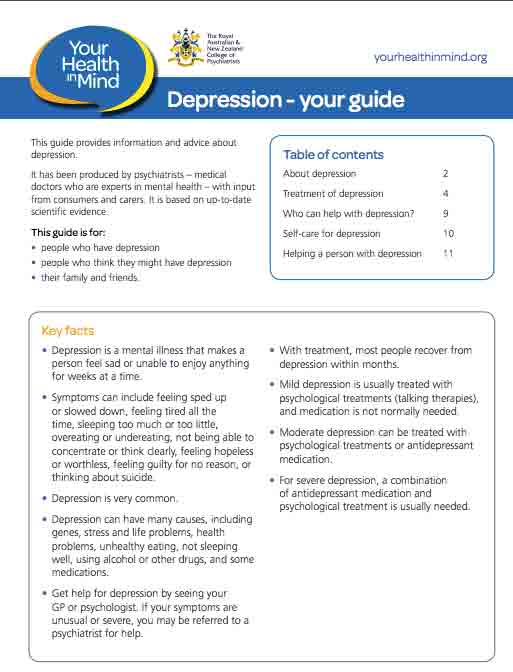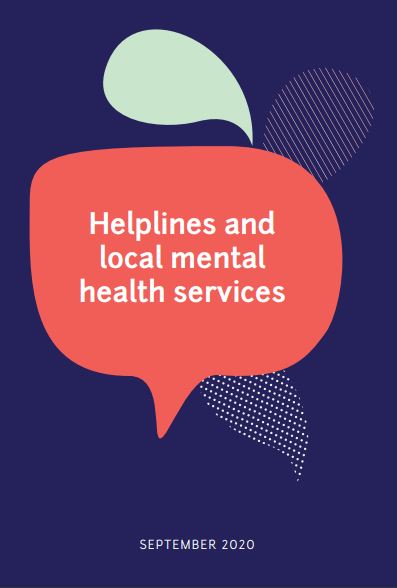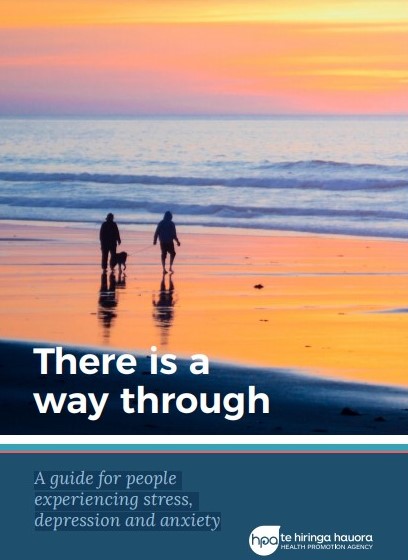Medication
Your doctor will recommend medication called antidepressants. The goals of treatment is to reduce your symptoms of depression, to make a full recovery and to prevent the symptoms from recurring. Antidepressants work best when used together with psychological therapy and lifestyle changes.
There are various classes of antidepressants. The most commonly used antidepressants are selective serotonin re-uptake inhibitors (or SSRIs), such as citalopram, escitalopram, sertraline and fluoxetine. Most people will start noticing an improvement within 2 or 3 weeks but it will take 6 months or longer to get the full benefit.
If you have little improvement in your symptoms after about 3 weeks, your doctor may:
- change the dose
- try a different antidepressant (switching), such as mirtazapine, bupropion, tricyclic antidepressants, venlafaxine or monoamine-oxidase inhibitors, or inhibitors
- add a second medication (augmentation).
As many as 2 out of 3 people with severe depression will not respond to the initial antidepressant they were started on and will require a switch. Like all medicines, antidepressants cause side effects. Some side effects may wear off within a few days or weeks, but some can be ongoing and troublesome. If you experience side effects and find them troublesome, do not stop your medication. Instead talk to your doctor about switching to another antidepressant. It's normal to use antidepressants for many years if you have had many episodes of depression.
Your doctor will assess your symptoms regularly while you are taking medication and if after a few years you are coping well, they may consider gradually withdrawing medication. Coming off antidepressants should be done slowly to avoid withdrawal side effects. You are at increased risk of your symptoms coming back during the first 6 months after your medication has been stopped. If you feel unwell and that your symptoms seem to be recurring, talk to your doctor. You may need to restart your medication. You should also talk to your doctor if you become pregnant or plan to become pregnant. Read more about antidepressants.
If medication is not working well for you, or if your symptoms are quite complex, your doctor may also refer you to a psychiatrist. A psychiatrist is a medically trained specialist in mental health issues and medication for particular symptoms and conditions.
Psychotherapy
With severe depression, it’s important not to try and do it alone, but to get some form of face-to-face psychotherapy. Several kinds of therapy have been found to work well with depression – just make sure your therapist is trained, qualified and registered by a professional body.
People with moderate-to-severe depression who receive psychotherapy as well as taking antidepressants have been found to have fewer depressive symptoms and to be more often depression-free 6 months later compared with people who take antidepressants without having psychotherapy.
As well as helping with negative thinking, low feelings and dysfunctional behaviours, therapy can also address any underlying issues, such as past trauma or abuse, or other factors that may be contributing to your depression, such as substance abuse or other mental health conditions. You can ask your GP to recommend someone or find a counsellor(external link)(external link) yourself.
Electroconvulsive therapy (ECT)
If none of the above treatments is working for you, then you may be offered ECT. ECT is safe and effective treatment for more severe forms of depression. It is a procedure, done under general anaesthesia, in which small electric currents are passed through your brain, intentionally triggering a brief seizure. ECT seems to cause changes in your brain chemistry that can quickly reverse symptoms of certain mental illnesses, including depression.
There are strict criteria for use of ECT in New Zealand, but ECT achieves complete remission for 7 out of 10 people who have this treatment. There are strict criteria for prescribing ECT in New Zealand. They include:
- not improving after trying two different types of antidepressant medication
- side effects of antidepressant medication that make it unsuitable for you to continue
- your life is in danger because you are suicidal, your depression is chronic or because you have stopped eating or drinking
- you started to make an improvement with antidepressant medication or psychological therapies but did not continue to improve
- you have become very severely depressed after having a baby
- ECT has worked for you in the past.
There are side effects of ECT, in particular, memory loss, so even if you meet the criteria, it’s important to take time to talk any decision through with your doctor and get your questions answered before you go ahead with this treatment.
Hospitalisation
In rare cases, you may need to say in hospital for a while. This is usually only likely to happen if you are at high risk of risk of suicide, if you suffer from psychosis or if your depression is in the context of bipolar disorder.
Lifestyle changes
Even though it can be challenging to take good care of yourself when you are severely depressed, it’s important that you do what you can to improve your lifestyle. If you are struggling to do this for yourself, ask for help from friends or whānau members. They could motivate you to go for a walk by coming with you, or they could cook you a nutritious meal when you feel unable to. The following are the key areas to improve as much as you can.
Sleep
- Insomnia is closely associated with many mental illnesses, both as a symptom and a potential trigger.
- It co-occurs most commonly in major depression with around 80% of people diagnosed with depression experiencing insomnia.
Good sleep can improve your mood and also give you more resources for coping with life’s challenges. Find out about why sleep is important and check out these sleep tips or sleep apps. You could also try SHUTi(external link)(external link), an evidence-based CBT programme for insomnia that has been shown to reduce depression (note: there is a fee). If you are still having problems with your sleep, talk to your doctor about it.
Physical activity
- People who are inactive are up to twice as likely to have depressive symptoms than active people. Even one hour of exercise a week has been found to prevent depression.
- Find out more about physical activity and mental health and the general benefits of being active.
Diet
What we put into our bodies effects not only our physical health but also our mental wellbeing. A direct link has been found between diet and depression. Find out about healthy eating basics to make sure your diet is providing you with the nutrients to help keep depression at bay.
Alcohol and other drugs
It’s important to avoid using alcohol and other drugs as these can often make depression worse. You may feel like they give you a lift in mood, but the overall effect is to make things worse. Read more about alcohol and mental health.









